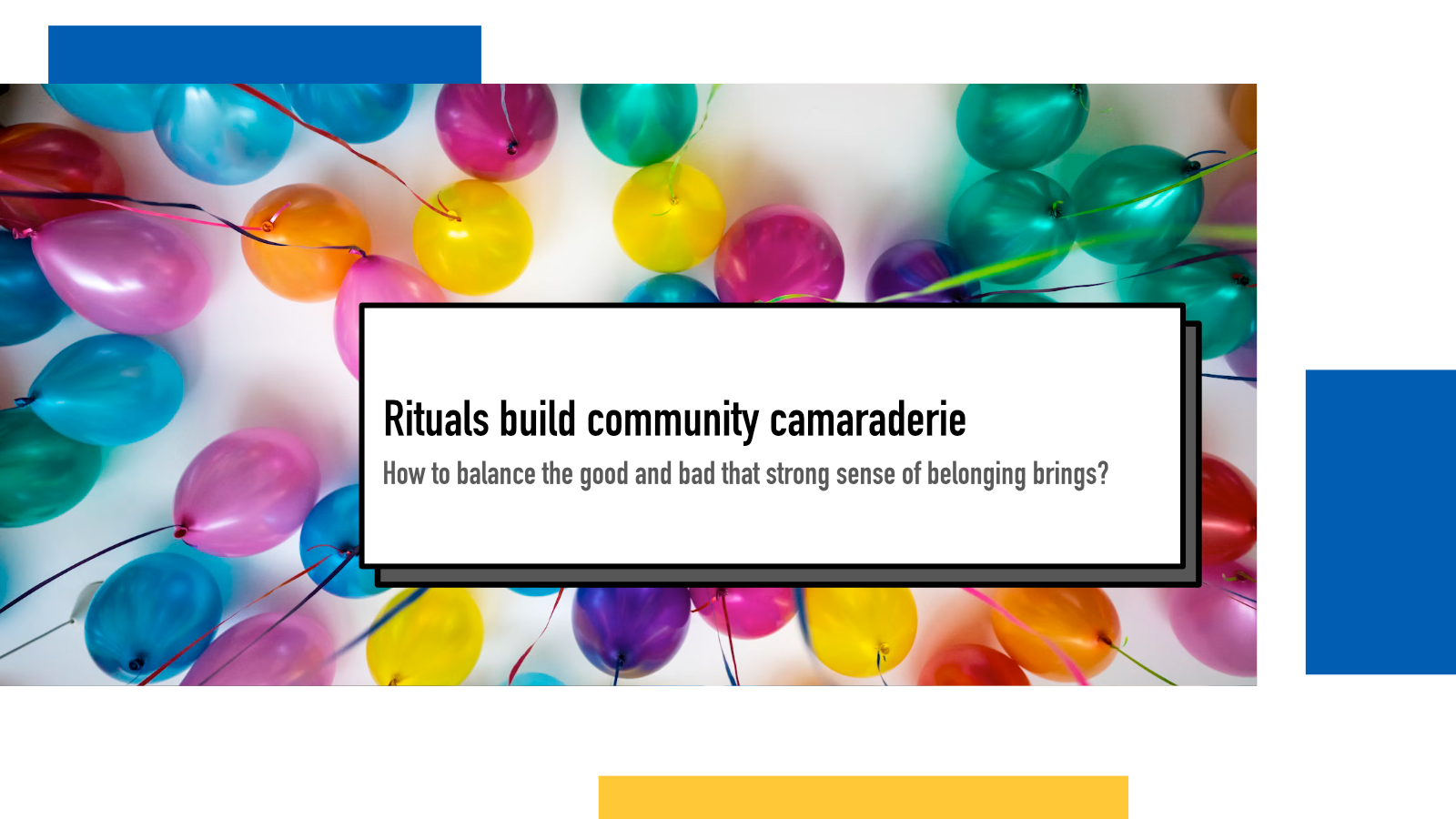Rituals build community camaraderie

Steve at Tangible Life invited us to write about rituals as part of this month’s IndieWeb Carnival:
A few prompts to inspire, but feel free to come at it from any angle at all:
- What value do rituals possess in your life?
- How have rituals shaped you?
- Are there any rituals you’ve outgrown and left behind?
- Does the term “ritual” carry any negative connotation when you hear it?
Initially I had a hard time figuring out what to write about. The only word associations that kept popping up in my head were religious rituals and rituals in agile development. I don’t really have anything meaningful to say about either.
But then one day as I was sitting outside pondering about my orbs, I figured there’s one thing I could write about: rituals in building community camaraderie.
There’s one thing that I find really difficult in building communities and it’s how to balance between having strong in-group sense with the benefits it offers without becoming too much of an in-group with its downsides like creating negativity against those not part of the group.
Rituals are a very effective way to build the sense of belonging in the community.
Joining and leaving a community
The first ritual a person participates with a community is when they join it. How it happens, really depends on the type of community: some allow self-sign up, others may require an invite or recommendation from an existing member; some you can join as a “passive” member and ramp up your participation as you get more comfortable, in others you’ll meet the new members in person in community events during their first visit.
Acknowledging the new members, welcoming them to the community and helping them find their place is a very powerful action towards creating a connection with your community.
To me, what really makes community a community, rather than just an audience, is the existence of interactions between the members of the community. As a community leader, you can strengthen that by helping new joining members find others who think alike or are in a similar situation or interested in similar topics.
People leaving is a natural part of a community. Often it happens unceremoniously and you might not even notice. In some communities however, there are clear points of exit: like graduation or running outside the age limits. These offer an opportunity to have rituals to celebrate their membership and being part of the group.
Not only do those graduation ceremonies show appreciation to those who are leaving but also shows that level of care to everyone who’s part of the community.
Regular rituals
Most of the communities that I build, are focused around regular gatherings: monthly tech meetups. I aim to keep these recognizable and uniform in style. This helps people build a mental model over time and feel that sense of comfort zone when they attend. With a nice mix of familiarity and switching things up, you can have a wonderful community where people find belonging, enjoyment and real connection.
Regular rituals are also the place where you build your culture. You can (and should) have written code of conducts and cultural guidelines but nothing imparts cultural expectations better than actively living them and making them visible. When people join, they adapt to the culture by following how others act and through these community rituals you can make a positive difference.
It also works the other way around: no matter what you’ve written down, if you tolerate bad behaviour, people will learn that as a norm and either do the same or leave because they don’t want to be part of it.
This blog post is part of a community ritual too: each month for the IndieWeb Carnival community, there’s (1) the announcement, followed be a month when we each (2) write our thoughts on a shared topic and finally there’s (3) a round up post where we learn what other people have been thinking about it.
I started participating in January and during this year, I’ve grown to excitedly wait what everyone writes and what new topics the hosts choose.
Does the term “ritual” carry any negative connotation when you hear it?
Steve also asked about the connotations the word carries. To me, ritual has a somewhat negative connotation, mainly through its association with “tradition”. I’m not big on tradition because I’ve experienced tradition often going down the route of “we do it because we’ve always done it” and have a very conservative attitude towards avoiding making any changes to them.
Rituals are also very in-group-y and that’s why I’m hesitant about them. That in-group feeling is very effective in building tight-knit communities but it’s very difficult to balance it by keeping in away from turning it into exclusionary things were people not part of the group are seen as somehow inferior or bad.
If the community revolves around one thing – which they usually tend to do – it’s easy to slip into thinking that other things (for example, other programming languages) are inferior or people using them are “others” just because you spend a lot of time within people who mainly discuss that one topic only. That’s one thing I’m worried about when building these communities: trying to balance the strong feeling of belonging with not alienating others.
If something above resonated with you, let's start a discussion about it! Email me at juhamattisantala at gmail dot com and share your thoughts. This year, I want to have more deeper discussions with people from around the world and I'd love if you'd be part of that.